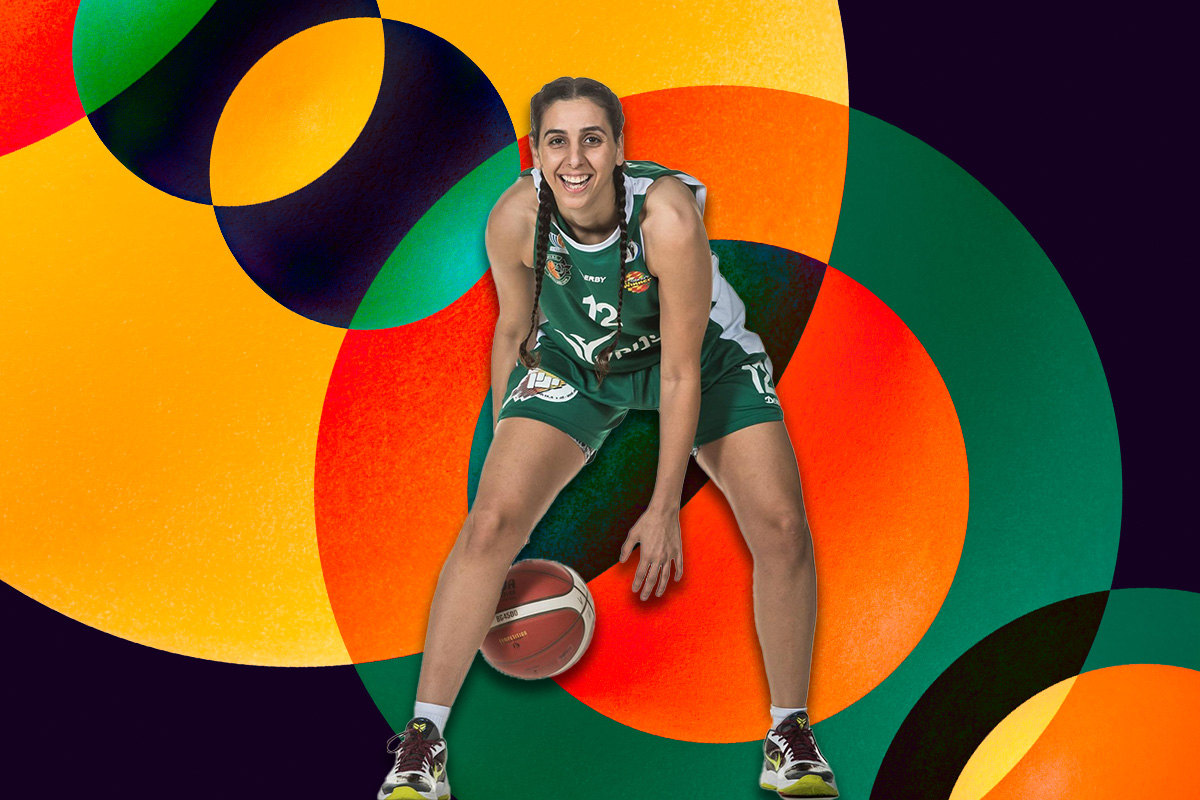Shahd Abboud grew up in a sports family. No, scratch that — Shahd Abboud grew up in a basketball family. Both of her parents played for years, and when she was born, her father was working as her mother’s coach (and the family was regularly attending her mother’s professional games throughout Abboud’s childhood). While it might be news that Israel and basketball are two worlds that coexist quite well, it’s probably not news that identity, sports, and gender intersect in Israel in ways that are enduringly unique for such a tiny little corner of the world.
In 2018, Hapoel Petah Tekva women’s basketball team named Shahd captain for the 2018-2019 season. Basketball teams name captains all the time; the news wasn’t exactly on everyone’s radar — even for fans of Israeli basketball. But the naming was a big deal for one groundbreaking reason: Abboud, 26, is the first Arab Israeli to earn the honor. (Abboud’s grandfather was a Palestinian who opted to get an Israeli passport in 1948, and she identifies as Christian and Arab.)
The Israel Basketball Premier League and the Israeli Female Basketball Premier League have hundreds of players on their rosters. In this context, groundbreaking is an understatement for what Abboud is doing.
Outside of Abboud, there is one other Arab Israeli professional basketball player in Israel right now, and he’s in the men’s league: Karam Mashour. Mashour was signed to Maccabi Tel Aviv with a bit of fanfare in 2017, becoming the only the fifth Arab-Israeli to play in the Israel Basketball Premier League. The first Arab-Israeli basketball player to play professionally in Israel was Nizhar Dahi — he played for Maccabi Netanya during the 1987-1988 season. Abboud, by all indications, is the first female Arab-Israeli professional basketball player in Israel.
While the tide is changing, playing a sport isn’t exactly a first choice for a lot of young Arab girls in Israel. As Abboud told Alma, Arabs in Israel face a series of barriers that make going into any sport a steep hill to climb. For a lot of Arab Israeli and Palestinian children, the emphasis from their families is on what can be achieved in a classroom first, with sports considered a second or third-tier hobby on the side.
“As minorities in Israel, we always feel we need to be better [than anyone else] in what we do in order to get a fair chance,” she explains. “Growing up, we know if you’re playing basketball or you’re playing any sports, you do this as a hobby, on the side to stay active, to do something else. We understand that it’s good for you, but we don’t look at it as a career.”
Making the choice to go from seventh-grader spotted by an Israeli scout to one of the strongest players in the entire country was deliberate; for Abboud, basketball has always been the way. Yet being committed to the sport wasn’t enough. Abboud explains that Arab Israeli towns, like her hometown of Nazareth, don’t always get the same funding that Israeli Jewish communities get, which means their athletes aren’t as well trained, coaches don’t have the same background, and it’s easy to stop playing sports and become focused on other goals as you get older. For a lot of Arab youth female players, those other goals include figuring out a career path, or starting a family, or both — not throwing a ball at a hoop and calling it a job.
That’s why Abboud is working hard to change how Arab girls in Israel feel about basketball, and sports in general. Working alongside American basketball trainer Tremaine Dalton of The Process Basketball, Abboud is organizing basketball camps for female Israeli Arab and Jewish youth players. The first camp, planned for Passover 2022, will bring together girls from a variety of backgrounds to work and play basketball together.
Dalton and Abboud began working together before the Israeli Female Basketball Premier League season began in 2021. She was named the league’s MVP for the 2019-2020 season, but was injured soon after, and enlisted the American trainer to build her back up ahead of the 2021-2022 season. As soon as Israel relaxed their COVID restrictions, Dalton headed back to the country he called home for several years. He was eager to return to training some of Israel’s top names in the sport, since he’s known as a bit of a “fixer” in the game — he works with players who are making a comeback or working toward a higher goal. In addition to Abboud, Dalton works with Hapoel Tel Aviv’s James Young, who came to the country after spending time on the New York Knicks’ G League team, as well as Maccabi Tel Aviv’s Roman Sorkin and Hapoel Jerusalem’s Willy Workman. Dalton has always worked with female basketball players alongside their male counterparts; building a girl’s youth training program is a logical next step in his ongoing relationship with Israeli basketball.
Dalton told Alma that now is the time for such a program in Israel in a lot of ways, explaining, “Israel is ideal because, simply put, there’s no better place to build a program that helps communities find commonality through youth sports.” Dalton believes in reducing the gender gap between men’s and women’s basketball; he wants to create opportunities for women and girls to receive the same level of training and coaching that so many men and boys in Israel get.
Being named captain in 2018 was monumental for Shahd Abboud. Looking back, Abboud says she realizes that the honor opens a door for other Arab girls to walk through. As she put it, “If you’re good, you’re going to get your chance. I want people to understand that. I want young [women] to look at me and say, ‘Okay, she made it, she did it. If she did it, I can do it as well.’ That is very special to me, to be the first one to do it.” To many more in the future.
Want more Jewish sports news? Sign up for The Jewish Sport Report.



